Business Economics: Monetary and Fiscal Policies in the UK
VerifiedAdded on 2023/01/03
|8
|2132
|25
Report
AI Summary
This report provides an executive summary of monetary and fiscal policies, focusing on their roles in economic growth and stability, particularly within the UK. It explores how these policies, managed by the Bank of England and the government, influence inflation, interest rates, and the overall economic cycle. The report details the impact of these policies on businesses, including strategic adjustments during recessions and periods of economic expansion, and highlights the government's crucial role in policy formulation. It also examines specific examples, such as the responses to the 2009 recession, and concludes by summarizing the effects of monetary and fiscal policies on business operations and the broader economic landscape. The report references key economic concepts and provides a detailed overview of the UK's approach to managing its economy through these critical policy instruments.
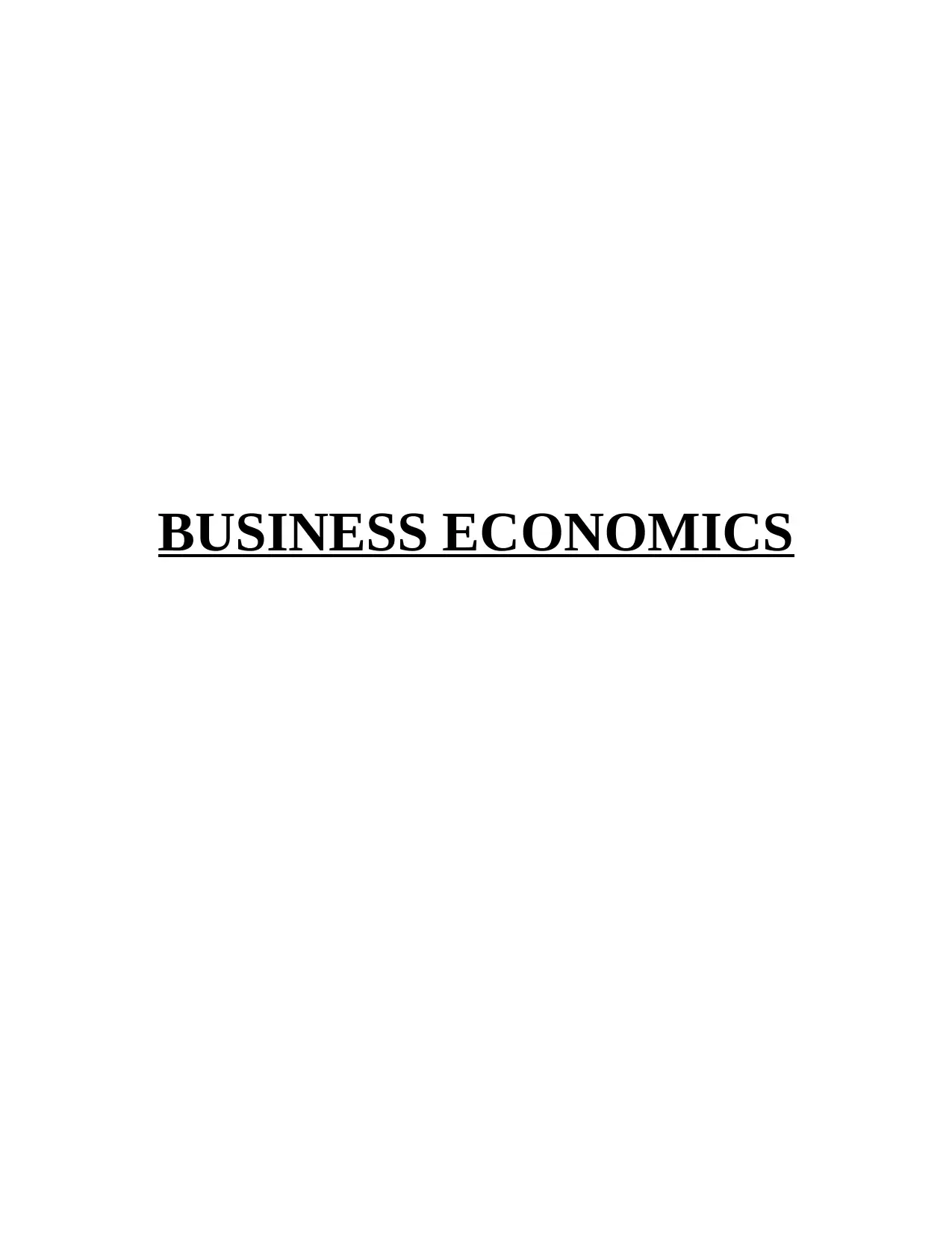
BUSINESS ECONOMICS
Paraphrase This Document
Need a fresh take? Get an instant paraphrase of this document with our AI Paraphraser
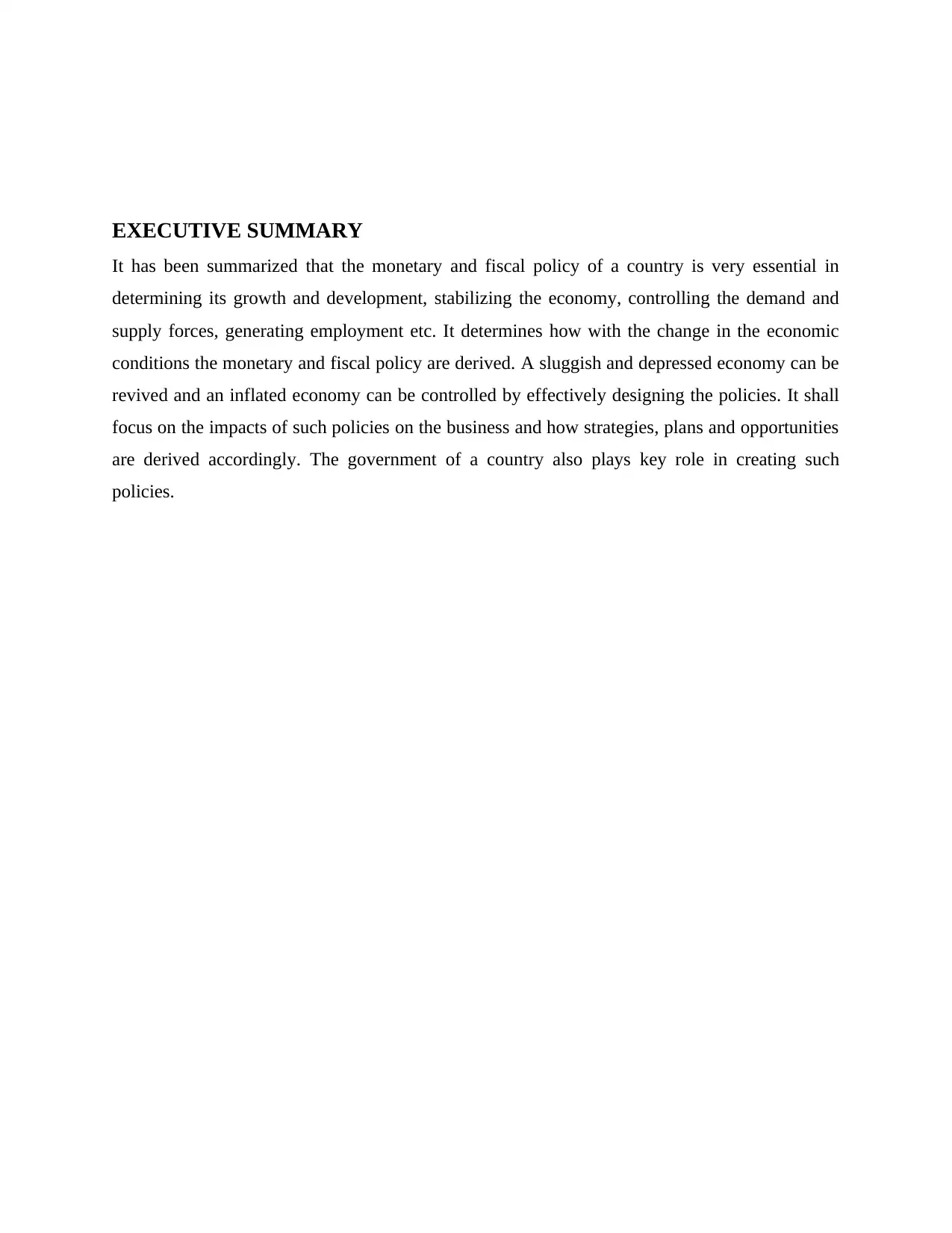
EXECUTIVE SUMMARY
It has been summarized that the monetary and fiscal policy of a country is very essential in
determining its growth and development, stabilizing the economy, controlling the demand and
supply forces, generating employment etc. It determines how with the change in the economic
conditions the monetary and fiscal policy are derived. A sluggish and depressed economy can be
revived and an inflated economy can be controlled by effectively designing the policies. It shall
focus on the impacts of such policies on the business and how strategies, plans and opportunities
are derived accordingly. The government of a country also plays key role in creating such
policies.
It has been summarized that the monetary and fiscal policy of a country is very essential in
determining its growth and development, stabilizing the economy, controlling the demand and
supply forces, generating employment etc. It determines how with the change in the economic
conditions the monetary and fiscal policy are derived. A sluggish and depressed economy can be
revived and an inflated economy can be controlled by effectively designing the policies. It shall
focus on the impacts of such policies on the business and how strategies, plans and opportunities
are derived accordingly. The government of a country also plays key role in creating such
policies.

Table of Contents
EXECUTIVE SUMMARY.............................................................................................................2
INTRODUCTION...........................................................................................................................4
BACKGROUND.............................................................................................................................4
Monetary Policy..........................................................................................................................4
Fiscal Policy................................................................................................................................4
Monetary Policy in UK...............................................................................................................5
Fiscal Policy in UK.....................................................................................................................5
Impact of the Monetary and Fiscal policy...................................................................................6
Role of Government in the economic arena................................................................................6
Impact of policies on the Businesses..........................................................................................6
CONCLUSION................................................................................................................................7
REFERENCES................................................................................................................................8
EXECUTIVE SUMMARY.............................................................................................................2
INTRODUCTION...........................................................................................................................4
BACKGROUND.............................................................................................................................4
Monetary Policy..........................................................................................................................4
Fiscal Policy................................................................................................................................4
Monetary Policy in UK...............................................................................................................5
Fiscal Policy in UK.....................................................................................................................5
Impact of the Monetary and Fiscal policy...................................................................................6
Role of Government in the economic arena................................................................................6
Impact of policies on the Businesses..........................................................................................6
CONCLUSION................................................................................................................................7
REFERENCES................................................................................................................................8
⊘ This is a preview!⊘
Do you want full access?
Subscribe today to unlock all pages.

Trusted by 1+ million students worldwide
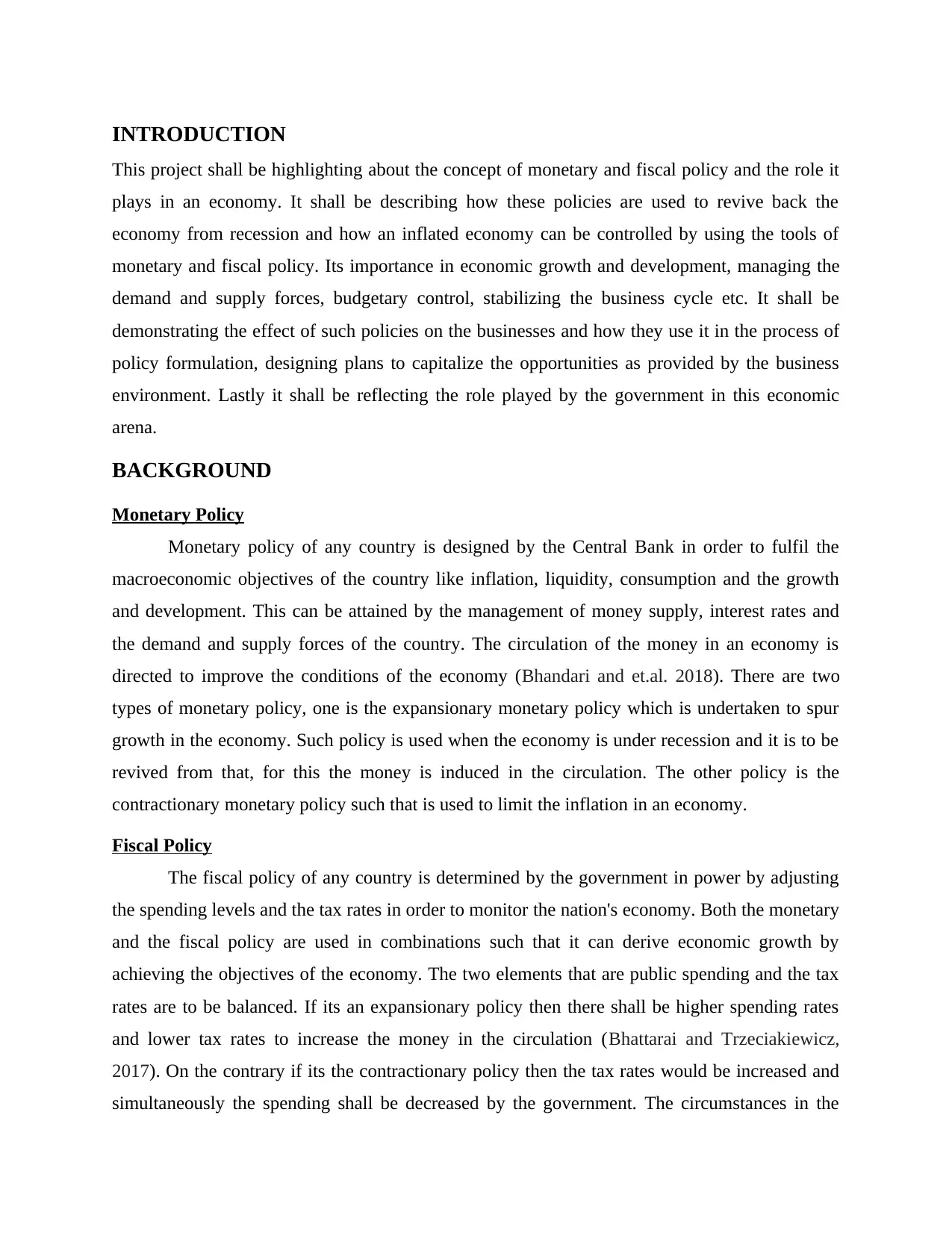
INTRODUCTION
This project shall be highlighting about the concept of monetary and fiscal policy and the role it
plays in an economy. It shall be describing how these policies are used to revive back the
economy from recession and how an inflated economy can be controlled by using the tools of
monetary and fiscal policy. Its importance in economic growth and development, managing the
demand and supply forces, budgetary control, stabilizing the business cycle etc. It shall be
demonstrating the effect of such policies on the businesses and how they use it in the process of
policy formulation, designing plans to capitalize the opportunities as provided by the business
environment. Lastly it shall be reflecting the role played by the government in this economic
arena.
BACKGROUND
Monetary Policy
Monetary policy of any country is designed by the Central Bank in order to fulfil the
macroeconomic objectives of the country like inflation, liquidity, consumption and the growth
and development. This can be attained by the management of money supply, interest rates and
the demand and supply forces of the country. The circulation of the money in an economy is
directed to improve the conditions of the economy (Bhandari and et.al. 2018). There are two
types of monetary policy, one is the expansionary monetary policy which is undertaken to spur
growth in the economy. Such policy is used when the economy is under recession and it is to be
revived from that, for this the money is induced in the circulation. The other policy is the
contractionary monetary policy such that is used to limit the inflation in an economy.
Fiscal Policy
The fiscal policy of any country is determined by the government in power by adjusting
the spending levels and the tax rates in order to monitor the nation's economy. Both the monetary
and the fiscal policy are used in combinations such that it can derive economic growth by
achieving the objectives of the economy. The two elements that are public spending and the tax
rates are to be balanced. If its an expansionary policy then there shall be higher spending rates
and lower tax rates to increase the money in the circulation (Bhattarai and Trzeciakiewicz,
2017). On the contrary if its the contractionary policy then the tax rates would be increased and
simultaneously the spending shall be decreased by the government. The circumstances in the
This project shall be highlighting about the concept of monetary and fiscal policy and the role it
plays in an economy. It shall be describing how these policies are used to revive back the
economy from recession and how an inflated economy can be controlled by using the tools of
monetary and fiscal policy. Its importance in economic growth and development, managing the
demand and supply forces, budgetary control, stabilizing the business cycle etc. It shall be
demonstrating the effect of such policies on the businesses and how they use it in the process of
policy formulation, designing plans to capitalize the opportunities as provided by the business
environment. Lastly it shall be reflecting the role played by the government in this economic
arena.
BACKGROUND
Monetary Policy
Monetary policy of any country is designed by the Central Bank in order to fulfil the
macroeconomic objectives of the country like inflation, liquidity, consumption and the growth
and development. This can be attained by the management of money supply, interest rates and
the demand and supply forces of the country. The circulation of the money in an economy is
directed to improve the conditions of the economy (Bhandari and et.al. 2018). There are two
types of monetary policy, one is the expansionary monetary policy which is undertaken to spur
growth in the economy. Such policy is used when the economy is under recession and it is to be
revived from that, for this the money is induced in the circulation. The other policy is the
contractionary monetary policy such that is used to limit the inflation in an economy.
Fiscal Policy
The fiscal policy of any country is determined by the government in power by adjusting
the spending levels and the tax rates in order to monitor the nation's economy. Both the monetary
and the fiscal policy are used in combinations such that it can derive economic growth by
achieving the objectives of the economy. The two elements that are public spending and the tax
rates are to be balanced. If its an expansionary policy then there shall be higher spending rates
and lower tax rates to increase the money in the circulation (Bhattarai and Trzeciakiewicz,
2017). On the contrary if its the contractionary policy then the tax rates would be increased and
simultaneously the spending shall be decreased by the government. The circumstances in the
Paraphrase This Document
Need a fresh take? Get an instant paraphrase of this document with our AI Paraphraser

economy decides which policy is to be applied such that the objectives are met by the
government.
Monetary Policy in UK
The monetary policy in UK is framed by its central bank which is Bank of England. Bank
of England formulates the policy in a way to stabilize the economy and it influences the amount
of money in the economy and how much it costs to borrow such money. In the opinion of the
central bank and the government of UK, low and stable inflation rate is good for the country's
economy and so maintaining this level remains the aim of the monetary policies. The target is to
keep the inflation rate up to 2% and so the interest rates are decided accordingly. All the other
objectives of the country are also kept in mind like employment generation, growth, standards of
living etc. To form the policies two of the main monetary tools are used, one is the Bank rate
which is the rate at which Bank of England shall be extending loans to the other banks. The other
tool used for balancing the economy in UK is the quantitative easing in which the assets like
corporate and government bonds are purchased to create the money digitally (Bunn, Pugh and
Yeates, 2018).
The Monetary Policy Committee is formed to formulate the policy around eight times in a year.
It is framed by conducting several meetings at different levels to decide the current condition of
the economy and where it is to be leaded. Quarterly such reports are submitted in which the
reasons behind such decisions are showed. The current bank rate in UK is 0.1% and the inflation
rate is about 0.3%.
Fiscal Policy in UK
The fiscal policy is designed by the government to influence the economic growth by
changing the taxation and spendings. It can adopt the expansionary fiscal policy if it wants to
stimulate the aggregate demand and boost the economic growth of the country. In this case it
shall increase its rate of spendings and lower down the tax rates which shall result in higher
borrowings of the government. On the other hand if the deflationary fiscal policy is being used it
shall minimize the aggregate demand and the inflationary pressures in the economy. For this the
spending will be decreased and the taxes will be increased and so result shall be lower
borrowings (Chugunov and Pasichnyi, 2018).
The fiscal policy created to moderate economic cycle is not generally used in UK due to some
political issues. The stabilizing and the management of the economy is generally left in the hands
government.
Monetary Policy in UK
The monetary policy in UK is framed by its central bank which is Bank of England. Bank
of England formulates the policy in a way to stabilize the economy and it influences the amount
of money in the economy and how much it costs to borrow such money. In the opinion of the
central bank and the government of UK, low and stable inflation rate is good for the country's
economy and so maintaining this level remains the aim of the monetary policies. The target is to
keep the inflation rate up to 2% and so the interest rates are decided accordingly. All the other
objectives of the country are also kept in mind like employment generation, growth, standards of
living etc. To form the policies two of the main monetary tools are used, one is the Bank rate
which is the rate at which Bank of England shall be extending loans to the other banks. The other
tool used for balancing the economy in UK is the quantitative easing in which the assets like
corporate and government bonds are purchased to create the money digitally (Bunn, Pugh and
Yeates, 2018).
The Monetary Policy Committee is formed to formulate the policy around eight times in a year.
It is framed by conducting several meetings at different levels to decide the current condition of
the economy and where it is to be leaded. Quarterly such reports are submitted in which the
reasons behind such decisions are showed. The current bank rate in UK is 0.1% and the inflation
rate is about 0.3%.
Fiscal Policy in UK
The fiscal policy is designed by the government to influence the economic growth by
changing the taxation and spendings. It can adopt the expansionary fiscal policy if it wants to
stimulate the aggregate demand and boost the economic growth of the country. In this case it
shall increase its rate of spendings and lower down the tax rates which shall result in higher
borrowings of the government. On the other hand if the deflationary fiscal policy is being used it
shall minimize the aggregate demand and the inflationary pressures in the economy. For this the
spending will be decreased and the taxes will be increased and so result shall be lower
borrowings (Chugunov and Pasichnyi, 2018).
The fiscal policy created to moderate economic cycle is not generally used in UK due to some
political issues. The stabilizing and the management of the economy is generally left in the hands
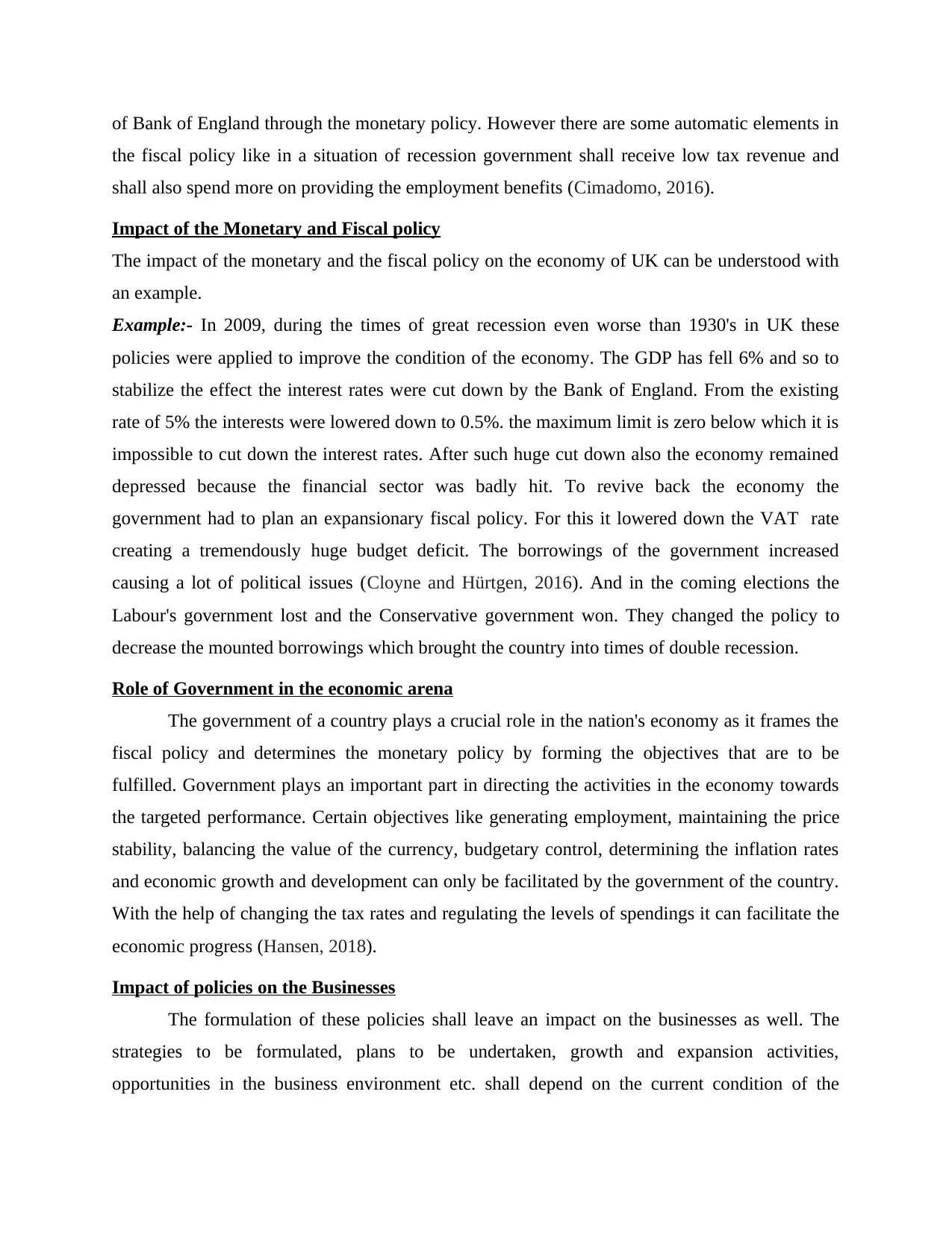
of Bank of England through the monetary policy. However there are some automatic elements in
the fiscal policy like in a situation of recession government shall receive low tax revenue and
shall also spend more on providing the employment benefits (Cimadomo, 2016).
Impact of the Monetary and Fiscal policy
The impact of the monetary and the fiscal policy on the economy of UK can be understood with
an example.
Example:- In 2009, during the times of great recession even worse than 1930's in UK these
policies were applied to improve the condition of the economy. The GDP has fell 6% and so to
stabilize the effect the interest rates were cut down by the Bank of England. From the existing
rate of 5% the interests were lowered down to 0.5%. the maximum limit is zero below which it is
impossible to cut down the interest rates. After such huge cut down also the economy remained
depressed because the financial sector was badly hit. To revive back the economy the
government had to plan an expansionary fiscal policy. For this it lowered down the VAT rate
creating a tremendously huge budget deficit. The borrowings of the government increased
causing a lot of political issues (Cloyne and Hürtgen, 2016). And in the coming elections the
Labour's government lost and the Conservative government won. They changed the policy to
decrease the mounted borrowings which brought the country into times of double recession.
Role of Government in the economic arena
The government of a country plays a crucial role in the nation's economy as it frames the
fiscal policy and determines the monetary policy by forming the objectives that are to be
fulfilled. Government plays an important part in directing the activities in the economy towards
the targeted performance. Certain objectives like generating employment, maintaining the price
stability, balancing the value of the currency, budgetary control, determining the inflation rates
and economic growth and development can only be facilitated by the government of the country.
With the help of changing the tax rates and regulating the levels of spendings it can facilitate the
economic progress (Hansen, 2018).
Impact of policies on the Businesses
The formulation of these policies shall leave an impact on the businesses as well. The
strategies to be formulated, plans to be undertaken, growth and expansion activities,
opportunities in the business environment etc. shall depend on the current condition of the
the fiscal policy like in a situation of recession government shall receive low tax revenue and
shall also spend more on providing the employment benefits (Cimadomo, 2016).
Impact of the Monetary and Fiscal policy
The impact of the monetary and the fiscal policy on the economy of UK can be understood with
an example.
Example:- In 2009, during the times of great recession even worse than 1930's in UK these
policies were applied to improve the condition of the economy. The GDP has fell 6% and so to
stabilize the effect the interest rates were cut down by the Bank of England. From the existing
rate of 5% the interests were lowered down to 0.5%. the maximum limit is zero below which it is
impossible to cut down the interest rates. After such huge cut down also the economy remained
depressed because the financial sector was badly hit. To revive back the economy the
government had to plan an expansionary fiscal policy. For this it lowered down the VAT rate
creating a tremendously huge budget deficit. The borrowings of the government increased
causing a lot of political issues (Cloyne and Hürtgen, 2016). And in the coming elections the
Labour's government lost and the Conservative government won. They changed the policy to
decrease the mounted borrowings which brought the country into times of double recession.
Role of Government in the economic arena
The government of a country plays a crucial role in the nation's economy as it frames the
fiscal policy and determines the monetary policy by forming the objectives that are to be
fulfilled. Government plays an important part in directing the activities in the economy towards
the targeted performance. Certain objectives like generating employment, maintaining the price
stability, balancing the value of the currency, budgetary control, determining the inflation rates
and economic growth and development can only be facilitated by the government of the country.
With the help of changing the tax rates and regulating the levels of spendings it can facilitate the
economic progress (Hansen, 2018).
Impact of policies on the Businesses
The formulation of these policies shall leave an impact on the businesses as well. The
strategies to be formulated, plans to be undertaken, growth and expansion activities,
opportunities in the business environment etc. shall depend on the current condition of the
⊘ This is a preview!⊘
Do you want full access?
Subscribe today to unlock all pages.

Trusted by 1+ million students worldwide
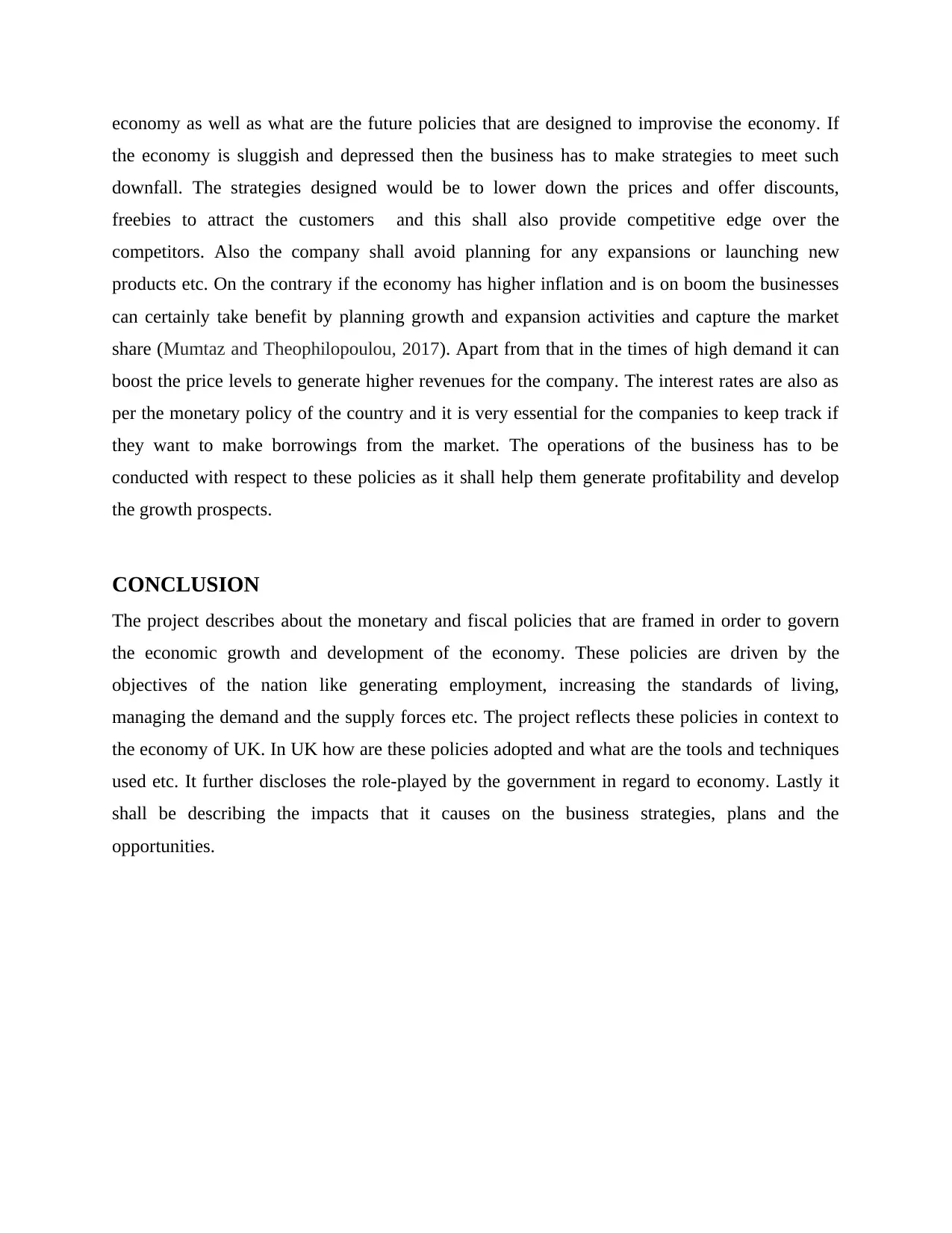
economy as well as what are the future policies that are designed to improvise the economy. If
the economy is sluggish and depressed then the business has to make strategies to meet such
downfall. The strategies designed would be to lower down the prices and offer discounts,
freebies to attract the customers and this shall also provide competitive edge over the
competitors. Also the company shall avoid planning for any expansions or launching new
products etc. On the contrary if the economy has higher inflation and is on boom the businesses
can certainly take benefit by planning growth and expansion activities and capture the market
share (Mumtaz and Theophilopoulou, 2017). Apart from that in the times of high demand it can
boost the price levels to generate higher revenues for the company. The interest rates are also as
per the monetary policy of the country and it is very essential for the companies to keep track if
they want to make borrowings from the market. The operations of the business has to be
conducted with respect to these policies as it shall help them generate profitability and develop
the growth prospects.
CONCLUSION
The project describes about the monetary and fiscal policies that are framed in order to govern
the economic growth and development of the economy. These policies are driven by the
objectives of the nation like generating employment, increasing the standards of living,
managing the demand and the supply forces etc. The project reflects these policies in context to
the economy of UK. In UK how are these policies adopted and what are the tools and techniques
used etc. It further discloses the role-played by the government in regard to economy. Lastly it
shall be describing the impacts that it causes on the business strategies, plans and the
opportunities.
the economy is sluggish and depressed then the business has to make strategies to meet such
downfall. The strategies designed would be to lower down the prices and offer discounts,
freebies to attract the customers and this shall also provide competitive edge over the
competitors. Also the company shall avoid planning for any expansions or launching new
products etc. On the contrary if the economy has higher inflation and is on boom the businesses
can certainly take benefit by planning growth and expansion activities and capture the market
share (Mumtaz and Theophilopoulou, 2017). Apart from that in the times of high demand it can
boost the price levels to generate higher revenues for the company. The interest rates are also as
per the monetary policy of the country and it is very essential for the companies to keep track if
they want to make borrowings from the market. The operations of the business has to be
conducted with respect to these policies as it shall help them generate profitability and develop
the growth prospects.
CONCLUSION
The project describes about the monetary and fiscal policies that are framed in order to govern
the economic growth and development of the economy. These policies are driven by the
objectives of the nation like generating employment, increasing the standards of living,
managing the demand and the supply forces etc. The project reflects these policies in context to
the economy of UK. In UK how are these policies adopted and what are the tools and techniques
used etc. It further discloses the role-played by the government in regard to economy. Lastly it
shall be describing the impacts that it causes on the business strategies, plans and the
opportunities.
Paraphrase This Document
Need a fresh take? Get an instant paraphrase of this document with our AI Paraphraser
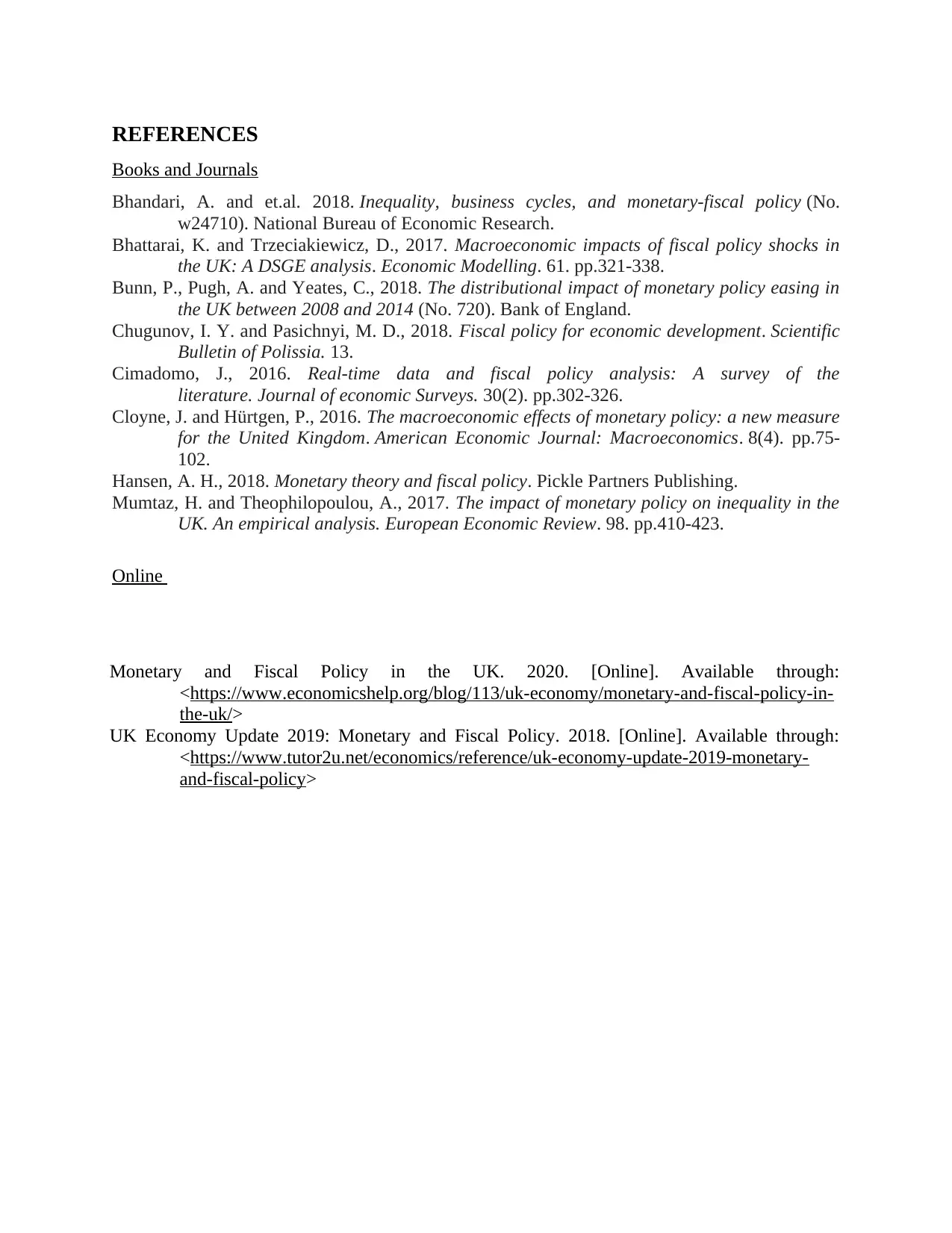
REFERENCES
Books and Journals
Bhandari, A. and et.al. 2018. Inequality, business cycles, and monetary-fiscal policy (No.
w24710). National Bureau of Economic Research.
Bhattarai, K. and Trzeciakiewicz, D., 2017. Macroeconomic impacts of fiscal policy shocks in
the UK: A DSGE analysis. Economic Modelling. 61. pp.321-338.
Bunn, P., Pugh, A. and Yeates, C., 2018. The distributional impact of monetary policy easing in
the UK between 2008 and 2014 (No. 720). Bank of England.
Chugunov, I. Y. and Pasichnyi, M. D., 2018. Fiscal policy for economic development. Scientific
Bulletin of Polissia. 13.
Cimadomo, J., 2016. Real‐time data and fiscal policy analysis: A survey of the
literature. Journal of economic Surveys. 30(2). pp.302-326.
Cloyne, J. and Hürtgen, P., 2016. The macroeconomic effects of monetary policy: a new measure
for the United Kingdom. American Economic Journal: Macroeconomics. 8(4). pp.75-
102.
Hansen, A. H., 2018. Monetary theory and fiscal policy. Pickle Partners Publishing.
Mumtaz, H. and Theophilopoulou, A., 2017. The impact of monetary policy on inequality in the
UK. An empirical analysis. European Economic Review. 98. pp.410-423.
Online
Monetary and Fiscal Policy in the UK. 2020. [Online]. Available through:
<https://www.economicshelp.org/blog/113/uk-economy/monetary-and-fiscal-policy-in-
the-uk/>
UK Economy Update 2019: Monetary and Fiscal Policy. 2018. [Online]. Available through:
<https://www.tutor2u.net/economics/reference/uk-economy-update-2019-monetary-
and-fiscal-policy>
Books and Journals
Bhandari, A. and et.al. 2018. Inequality, business cycles, and monetary-fiscal policy (No.
w24710). National Bureau of Economic Research.
Bhattarai, K. and Trzeciakiewicz, D., 2017. Macroeconomic impacts of fiscal policy shocks in
the UK: A DSGE analysis. Economic Modelling. 61. pp.321-338.
Bunn, P., Pugh, A. and Yeates, C., 2018. The distributional impact of monetary policy easing in
the UK between 2008 and 2014 (No. 720). Bank of England.
Chugunov, I. Y. and Pasichnyi, M. D., 2018. Fiscal policy for economic development. Scientific
Bulletin of Polissia. 13.
Cimadomo, J., 2016. Real‐time data and fiscal policy analysis: A survey of the
literature. Journal of economic Surveys. 30(2). pp.302-326.
Cloyne, J. and Hürtgen, P., 2016. The macroeconomic effects of monetary policy: a new measure
for the United Kingdom. American Economic Journal: Macroeconomics. 8(4). pp.75-
102.
Hansen, A. H., 2018. Monetary theory and fiscal policy. Pickle Partners Publishing.
Mumtaz, H. and Theophilopoulou, A., 2017. The impact of monetary policy on inequality in the
UK. An empirical analysis. European Economic Review. 98. pp.410-423.
Online
Monetary and Fiscal Policy in the UK. 2020. [Online]. Available through:
<https://www.economicshelp.org/blog/113/uk-economy/monetary-and-fiscal-policy-in-
the-uk/>
UK Economy Update 2019: Monetary and Fiscal Policy. 2018. [Online]. Available through:
<https://www.tutor2u.net/economics/reference/uk-economy-update-2019-monetary-
and-fiscal-policy>
1 out of 8
Related Documents
Your All-in-One AI-Powered Toolkit for Academic Success.
+13062052269
info@desklib.com
Available 24*7 on WhatsApp / Email
![[object Object]](/_next/static/media/star-bottom.7253800d.svg)
Unlock your academic potential
Copyright © 2020–2026 A2Z Services. All Rights Reserved. Developed and managed by ZUCOL.





